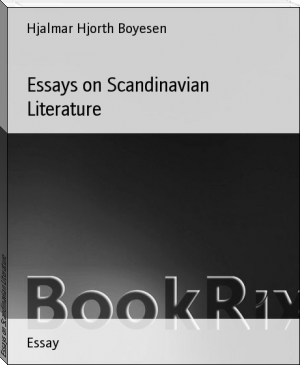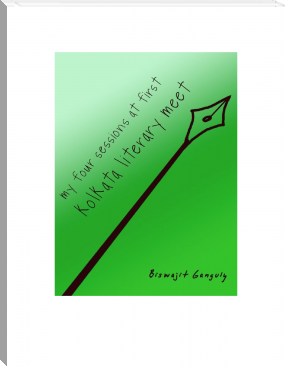Essays on Scandinavian Literature, Hjalmar Hjorth Boyesen [best ebook reader ubuntu txt] 📗

- Author: Hjalmar Hjorth Boyesen
Book online «Essays on Scandinavian Literature, Hjalmar Hjorth Boyesen [best ebook reader ubuntu txt] 📗». Author Hjalmar Hjorth Boyesen
Besides being the author of some minor comedies and a full-grown drama ("The Professor"), Kielland has published several novels, the more recent being "Poison" (1883), "Fortuna" (1884), "Snow" (1886), and "St. John's Eve" (1887).
The note of promise and suspense with which "Snow" ends is meant to be symbolic. From Kielland's point of view, Norway is yet wrapped in the wintry winding-sheet of a tyrannical orthodoxy, and all he dares assert is that the chains of frost and snow seem to be loosening. There is a spring feeling in the air.
This spring feeling is scarcely perceptible in his last book, "Jacob" (1890), which is written in anything but a hopeful mood. It is rather a protest against that optimism which in fiction we call poetic justice. The harsh and unsentimental logic of reality is emphasized with a ruthless disregard of rose-colored traditions.
From the pedagogic point of view, I have no doubt that "Jacob" would be classed as an immoral book. But the question of its morality is of less consequence than the question of its truth. The most modern literature, which is interpenetrated with the spirit of the age, has a way of asking dangerous questions--questions before which the reader, when he perceives their full scope, stands aghast. Our old idyllic faith in the goodness and wisdom of all mundane arrangements has undoubtedly received a shock. Our attitude toward the universe is changing with the change of its attitude toward us. What the thinking part of humanity is now largely engaged in doing is readjusting itself toward the world and the world toward it. Success is but adaptation to environment, and success is the supreme aim of the modern man. The authors who, by their fearless thinking and speaking, help us toward this readjustment should, in my opinion, whether we choose to accept their conclusions or not, be hailed as benefactors. It is in the ranks of these that Alexander Kielland has taken his place, and occupies a conspicuous position.
JONAS LIE
The last Norwegian novelist who is in the Parisian sense _arrivé_ is Jonas Lie.[12] The _Figaro_ has occupied itself with him of late; and before long, I venture to predict, London and New York will also have discovered him. English versions of a few of his earlier novels appeared, to be sure, twenty years ago--in very bad translations--and accordingly attracted no great attention. "The Visionary," which has recently been published in London, has had better luck, having been accorded a flattering reception. Of its popular success it is yet too early to speak. But even if Jonas Lie were not about to knock at our gates, I venture to say that I shall earn the gratitude of many a reader by making him acquainted with this rare, complex, and exceedingly modern spirit. For Jonas Lie is not (like so many of his brethren of the quill) a mere inoffensive gentleman who spins yarns for a living, but he is a forceful personality of bright perceptions and keen sensations, which has chosen to express itself through the medium of the novel. He dwells in a many-windowed house, with a large outlook upon the world and its manifold concerns. In a score of novels of varying degrees of excellence he has given us vividly realized bits of the views which his windows command. But what lends their chief charm to these uncompromising specimens of modern realism is a certain richness of temperament on the author's part, which suffuses even the harshest narrative with a rosy glow of hope. Though, generally speaking, there is no very close kinship between him and the French realists, I am tempted to apply to him Zola's beautiful characterization of Daudet: "Benevolent Nature placed him at that exquisite point where reality ends and poetry begins." Before he had yet written a single book, except a volume of flamboyant verse, Björnson said of him in a public speech: "His friends know that he only has to plunge his landing-net down into himself in order to bring it up full."
[12] Pronounced _Lee_.
The man who, in anticipation of his achievements, impressed Björnson so deeply with his genius, was, however, by others, who felt themselves to be no less entitled to an opinion, regarded as an "original," not to say a fool. That he was decidedly queer, his biography by Arne Garborg amply testifies.
"Two souls, alas, abide within my breast,
The one forever strives against the other,"
says Faust; and Jonas Lie's life and literary activity are apparently, in a very real sense, the result of a similar warfare. There was, indeed, a good ancestral reason for the duality of his nature. His father, a judge of sterling ability and uprightness, was descended, but a few generations back, from sturdy, blond, Norwegian peasants; while his mother was of Finnish, or possibly Gypsy, descent. I remember well this black-eyed, eccentric little lady, with her queer ways, extraordinary costumes, and still more extraordinary conversation. It is from her Jonas Lie has inherited the fantastic strain in his blood, the strange, superstitious terrors, and the luxuriant wealth of color which he lavished upon his poems and his first novel, "The Visionary." From his paternal ancestors, who were for three generations judges and judicial functionaries, he has derived his good sense, his intense appreciation of detail, and his strong grip on reality. His career represents at its two poles a progression from the adventurous romanticism of his maternal heritage to the severe, wide-awake realism of the paternal--the emancipation of the Norseman from the Finn.
"Jonas Lie has a good memory," writes his biographer. "Thus he remembers--even though it be as through a haze--that he was once in the world as the son of a laborer, a carpenter, or something in that line, and that he went with food in a tin-pail to his father, when he was at work. During this incarnation he must have behaved rather shabbily; for in the next he found himself degraded to a fox--a silver fox--and in this capacity he was shot one moonlight night on the snow. After that he emerged, according to his recollection, as Jonas Lauritz Idemil, son of the lawyer Mons Lie, at Hougsund, in Eker. This took place November 6, 1833."
When he was but a few years old his father removed, in various official capacities, to Mandal, Söndhordland, and, finally, to the city of Tromsoe, in Nordland. It was here, in the extreme north, that Jonas spent the years of his boyhood, and it was this wild, enchanted region which put the deepest impress upon his spirit.
"In Nordland," he says in "The Visionary," the hero of which is essentially the Finnish half of himself, "all natural phenomena are intense, and appear in colossal contrasts. There is an endless, stony-gray desert as in primeval times, before men dwelt there; but in the midst of this are also endless natural riches. There is sun and glory of summer, the day of which is not only twelve hours, but lasts continuously, day and night, for three months--a warm, bright, fragrance-laden summer, with an infinite wealth of color and changing beauty. Distances of seventy to eighty miles across the mirror of the sea approach, as it were, within earshot. The mountains clothe themselves up to the very top with greenish-brown grass, and in the glens and ravines the little birches join hands for play, like white, sixteen-year-old girls; while the fragrance of the strawberry and raspberry fills the air as nowhere else; and the day is so hot that you feel a need to bathe yourself in the sun-steeped, plashing sea, so wondrously clear to the very bottom.... Myriads of birds are surging through the air, like white breakers about the cliffs, and like a screaming snow-storm about their brooding-places...."
But "as a contrast there is a night of darkness and terror which lasts nine months."
In this arctic gloom, during which the yellow candle-light struggled all day long through the frost-covered window-panes, the Finn grew big in Jonas Lie, and the Norseman shrank and was almost dwarfed. The air was teeming with superstitions which he could not help imbibing. His fancy fed eagerly on stories of Draugen, the terrible sea-bogie who yells heartrendingly in the storm, and the sight of whom means death; on blood-curdling tales of Finnish sorcery and all sorts of uncanny mysteries; on folk-legends of trolds, nixies, and foul-weather sprites. He had his full share of that craving for horrors which is common to boyhood; and he had also the most exceptional facilities for satisfying it. Truth to tell, if it had not been for the Norse Jekyll in his nature the Finnish Hyde might have run away with him altogether. They were mighty queer things which often invaded his brain, taking possession of his thought, paralyzing his will, and refusing to budge, no matter how earnestly he pleaded. There were times when he grew afraid of himself; when his imagination got the upper hand, blowing him hither and thither like a weather-cock. Then the Norse Jekyll came to his rescue and routed his uncomfortable yoke-fellow. Hence that very curious phenomenon that the same man who has given us sternly and soberly realistic novels like "The Family at Gilje" and "The Commodore's Daughters," is also the author of the collection of tales called "Trold," in which his fancy runs riot in a phantasmagoria of the grotesquest imaginings. The same Jonas Lie who comports himself so properly in the parlor is quite capable, it appears, of joining nocturnally the witches' dance at the Brocken and cutting up the wildest antics under the pale glimpses of the moon.
Throughout his boyhood he struggled rather ineffectually against his Hyde, who made him kill roosters, buy cakes on credit, go on forbidden expeditions by land and sea, and shamefully neglect his lessons. Accordingly, he made an early acquaintance with the rod, and was regarded as well-nigh incorrigible. He accepted with boyish stoicism the castigations which fell pretty regularly to his lot, bore no one any grudge for them, but rarely thought of mending his ways, in order to avoid them. They were somehow part of the established order of things which it was useless to criticise. In his reminiscences from his early years, which he published some years ago, he is so delightfully boy, that no one who has any recollection of that barbaric period in his own life can withhold his sympathy. The following, for instance, seems to me charming:
"I can still feel how she (Kvaen Marja, the maid) pulled us, cowering and reluctant, out of our warm beds, where we lay snug like birds in their nests, between the reindeer skin and the sheepskin covering. I remember how I stood asleep and tottering on the floor, until I got a shower of cold water from the bathing-sponge over my back and became wide awake. Then to jump into our clothes! And now for the lessons! It was a problem how to get a peep at them during the scant quarter hour, while the breakfast was being devoured down in





Comments (0)